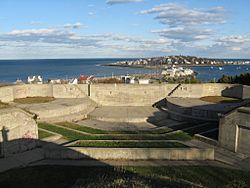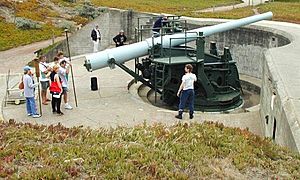Fort Revere facts for kids
Quick facts for kids Fort Revere |
|
|---|---|
| Part of Harbor Defenses of Boston | |
| Allerton Point, Hull, Massachusetts | |

Fort Revere Park overlooking Allerton and Hull.
|
|
|
Location in Massachusetts
|
|
| Coordinates | 42°18′17″N 70°54′21″W / 42.30472°N 70.90583°W |
| Type | Coastal Defense |
| Site information | |
| Owner | Massachusetts Department of Conservation and Recreation |
| Open to the public |
yes |
| Condition | some batteries buried, remainder in good condition |
| Site history | |
| Built | 1776, 1898–1906 |
| Built by | Patriot forces, French Marines, United States Army |
| In use | 1776–1782, 1901–1947 |
| Battles/wars | World War I World War II |
Fort Revere is a historic site covering about 8 acres in Hull, Massachusetts. It sits on Telegraph Hill and holds the remains of two old forts. One fort was built during the American Revolution, and the other was used from 1898 to 1947. Today, you can also find a water tower with a viewing deck, a military history museum, and picnic areas there. The Metropolitan Park System of Greater Boston runs it as Fort Revere Park.
Contents
History of Fort Revere
Revolutionary War Defenses
Telegraph Hill, where Fort Revere is located, was first fortified by American Patriot forces in 1776. This was during the American Revolution. The fort was called Fort Independence back then. Its main job was to protect Boston Harbor from enemy ships.
By 1777, the fort had places for 15 cannons. It also had two smaller gun batteries and a military hospital nearby. In 1778, the fort had 22 cannons.
Later in 1778, French Marines from D'Estaing's fleet helped expand the fort. They were supervised by a French general named du Portail, who was helping the American army. The French likely built a new 30-gun battery near the water, new barracks (places for soldiers to live), and a hospital. They also created a cemetery, which you can still see today.
After 1797, the fort's name changed to Fort Independence on Castle Island. The fort on Telegraph Hill was then sometimes called the Allerton Battery or "the French fort."
From the 1800s to the Early 1900s
After 1815, the fort probably wasn't used much. There's no record of it being active during the War of 1812. In the 1830s, new forts were suggested for Telegraph Hill, but they were never built. The old fort remains were later covered up when Fort Revere was built for World War I.
In the 1840s, Telegraph Hill became a semaphore station. This was a way to send messages using flags or signals. Later, it became a telegraph station and then a radio station.
Building Modern Coastal Defenses
Fort Revere was named after Paul Revere. The land was bought in 1897 as part of a big plan to build strong coastal defenses. This plan was called the Endicott program. Fort Revere was one of seven forts built to protect Boston Harbor. The fort's new gun batteries were constructed between 1898 and 1906.
Fort Revere had several important gun batteries:
- Battery Ripley: This battery had two very large 12-inch guns. These guns could shoot shells up to 18,400 yards (about 10.5 miles)! They were active from 1901 to 1943.
- Battery Sanders and Battery Pope: These batteries each had three 6-inch guns. These guns used a special "disappearing carriage." This meant the gun could be lowered out of sight after firing to be reloaded safely. These guns were active from 1903. Battery Pope's guns were removed in 1917, and Battery Sanders' guns were removed in 1943.
- Battery Field: This battery had two 5-inch guns. They also used a type of disappearing carriage. These guns were active from 1901 to 1917.
World War I and World War II
When the United States joined World War I in 1917, Fort Revere was expanded. More buildings were added for soldiers and supplies. Some of the fort's guns, like the 6-inch guns from Battery Pope and the 5-inch guns from Battery Field, were taken away. They were planned to be used on the battlefields in Europe, but they were never returned to Fort Revere.
In 1927, Fort Revere's large 12-inch guns became less important. This was because two even bigger 16-inch guns were built at nearby Fort Duvall. In 1936, an antiaircraft battery was added to Fort Revere to shoot down enemy planes.
During World War II, which started in 1939, Fort Revere was again made ready for action. However, as new defenses were built closer to Boston, Fort Revere's original guns were removed and scrapped in 1943. A new battery of four 90 mm guns was built in 1943 to protect against small enemy boats.
In 1947, Fort Revere was officially closed as a military site. It was then given to the state of Massachusetts.
Fort Revere Today
After the fort was closed, people worked to restore it, especially around the time of the United States' 200th birthday in 1976. Today, you can find outdoor theaters built inside the old fort walls. A small monument was put up in 1976 to remember the French soldiers who served and died at the fort during the Revolution.
Fort Revere Park is now a popular spot for visitors and local residents. The old officer's quarters building is now a museum. It has artillery displays outside and interactive exhibits inside. The park also hosts free movies and concerts in the summer.
Images for kids
 | Janet Taylor Pickett |
 | Synthia Saint James |
 | Howardena Pindell |
 | Faith Ringgold |





